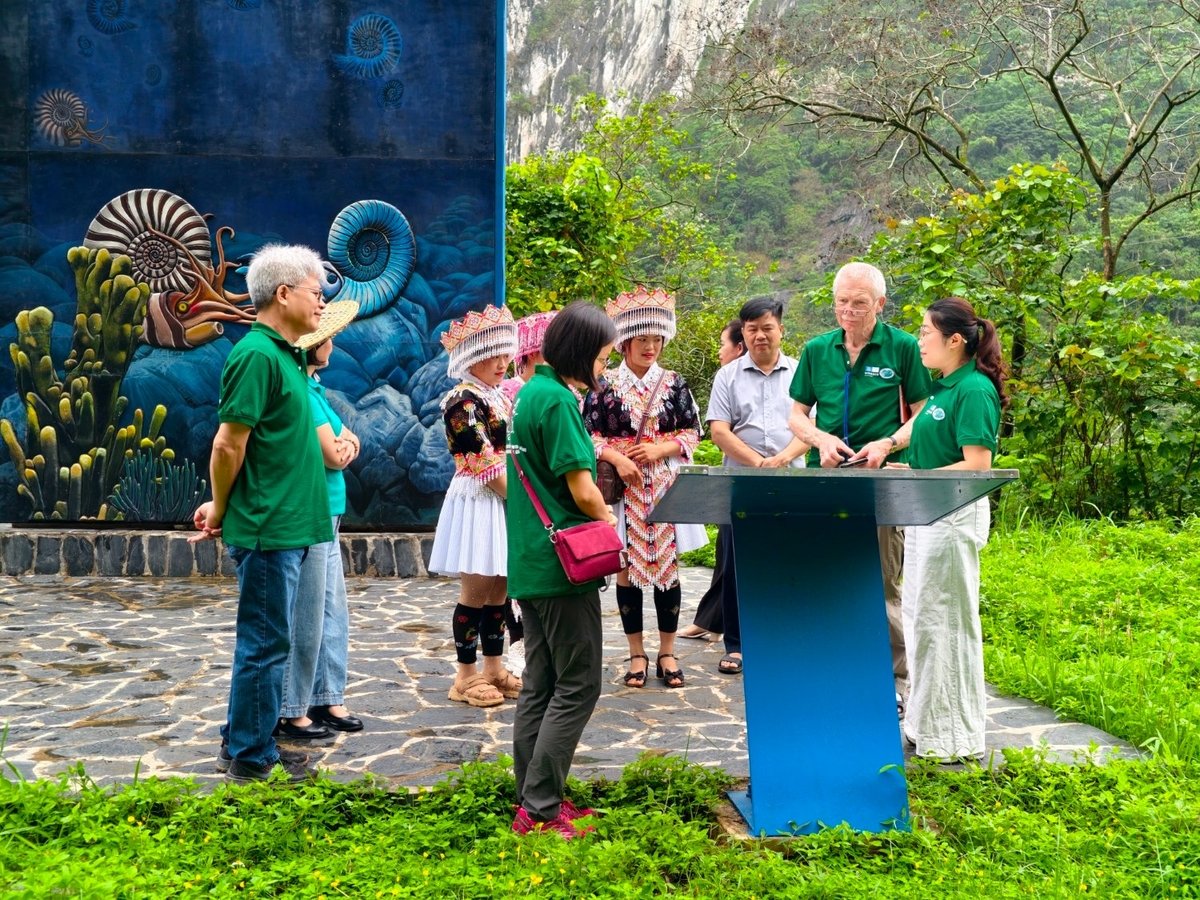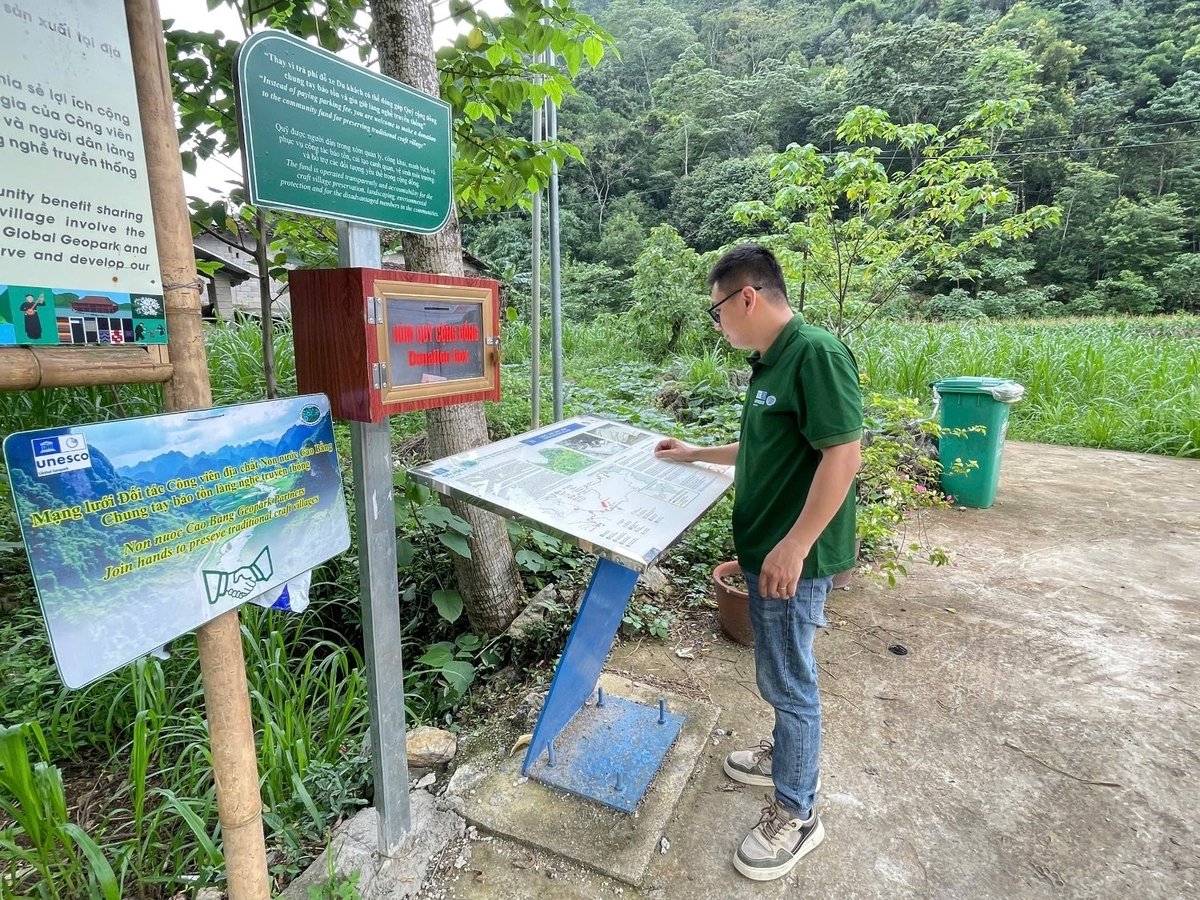June 14, 2025 | 14:22 GMT +7
June 14, 2025 | 14:22 GMT +7
Hotline: 0913.378.918
June 14, 2025 | 14:22 GMT +7
Hotline: 0913.378.918
As the province endeavors to preserve its UNESCO recognition, preserve its heritage, and adopt a more efficient governance structure, these changes present both challenges and opportunities.
Non nuoc Cao Bang, Vietnam's second UNESCO Global Geopark, covers more than 3,600 square kilometers and is located in eight districts, as well as the provincial capital. The region includes ancient karst formations, marine fossils, volcanic sediment layers, cave systems, cascades, and limestone lakes, all of which have a geological history lasting over 500 million years.
But beyond its rich geological features, what makes Cao Bang special is the harmony of its rocks, nature, and people. Diverse ethnic communities, including the Tay, Nung, Hmong, Dao, Kinh, Lo Lo, and San Chi, inhabit the park. These communities maintain traditional behaviors, languages, and indigenous knowledge systems, thereby creating a vibrant cultural landscape on ancient terrain.

A delegation of UNESCO experts conducted a field survey and assessment at the Ma Phuc Pass heritage site (Quang Hoa) in the Cao Bang Non Nuoc Geopark. Photo: Cao Bang Non Nuoc UNESCO Global Geopark.
Cao Bang has made significant investments in heritage conservation, which is closely linked to sustainable tourism, since its designation as a UNESCO World Heritage Site. Visitors have been able to investigate heritage sites and promote eco-friendly travel through initiatives such as themed discovery routes ("Phia Oac – Mountains of Change," "Back to the Roots," "Indigenous Culture in a Wonderland," and "Time of Fire and Flowers". The integration of educational programs on the Geopark into school curricula has facilitated the reintroduction of local languages, including Tay and Nung, into classrooms, thereby preserving intangible cultural heritage.
The park's community involvement is one of its values. Residents have taken on the roles of local guides, homestay proprietors, and volunteers, all of whom contribute to the preservation of heritage sites. These communal efforts serve to highlight the dynamic nature of the Geopark, a landscape that is both shaped and sustained by its inhabitants.
Nevertheless, the preservation of Global Geopark status necessitates more than just conservation. UNESCO's revalidation procedure evaluates a park's capacity to promote sustainable development, engage local communities, and operate efficiently, all of which are fundamental principles of the Global Geopark Network.
The June 2025 revalidation mission comes at a critical juncture, as Cao Bang is in the process of restructuring its administration under Vietnam's two-tier local government model, which involves the removal of district-level authorities. To prevent fragmented or inefficient supervision, this transition necessitates a new management structure.
UNESCO officials, led by Guy Martini, Secretary-General of the Global Geopark Network, have repeatedly emphasized that effective management is the most urgent issue for Non Nuoc Cao Bang. He suggests the establishment of a provincial-level Geopark Management Board, which an intercommunal coordination mechanism would facilitate. This would facilitate the coordination of conservation, tourism, and education initiatives among the 30 communes that host heritage sites.
Such models exist elsewhere. In France, "SIVOM" (intercommunal associations) enable small rural communities to collaborate in managing services, including environmental protection. In Germany, "Verbandsgemeinde" facilitate the sharing of budgets, personnel, and resources among neighboring municipalities.

Luc Khu landscape (Ha Quang). Photo: Non Nuoc Cao Bang UNESCO Global Geopark.
The UNESCO is optimistic that Cao Bang will be able to create a locally customized version of this intercommunal model, which will guarantee that all communes, regardless of their location in core zones, buffer areas, or development zones, share responsibility, voice, and benefit in the management of heritage.
Provincial leaders have committed to finalizing management reforms before the administrative transition in accordance with UNESCO's recommendations. Trinh Truong Huy, the Vice Chairman of the People's Committee, stated that Cao Bang is in the process of establishing a professional, streamlined, and regionally coordinated Management Board. Organizing events, coordinating tourism, leading community education, and enforcing regulations within the Geopark will be feasible for this board.
Simultaneously, a 2026–2030 action plan is being developed, with a focus on preserving cultural heritage, promoting eco-tourism, and fostering green economic development. To ensure the plan aligns with the Global Geopark Network's standards and the genuine needs of the Geopark, both domestic and international experts are contributing.
An efficient two-tier administrative model for Cao Bang could serve as a model for other Vietnamese provinces if the province successfully implements it. A well-functioning governance model would not only enhance park operations but also promote sustainable development and resource optimization nationwide, as Vietnam is currently in the process of nominating additional Global Geoparks.

The Management Board of Non Nuoc Cao Bang Geopark checks the signboard system at the Dia Tren paper village heritage site (Quang Hoa). Photo: Non Nuoc Cao Bang UNESCO Global Geopark.
The importance of maintaining UNESCO recognition extends beyond local prestige. It is a component of a more extensive national mission to demonstrate to the world that Vietnam not only safeguards its heritage but also revitalizes it through visionary governance and community engagement.
In this vision, individuals are not merely the custodians of heritage; they are also involved in its future. Cao Bang is currently investigating a pilot model of "heritage cooperatives," in which local residents participate in the benefits of sustainable development. This is consistent with the concept of "living heritage" as defined by UNESCO, which connects conservation with community resilience and well-being.
Cao Bang is not only ensuring its position on the global heritage map but also paving the way for Vietnam's comprehensive approach to protecting natural and cultural treasures by maintaining its "green card”.
Translated by Linh Linh
/2025/06/13/5330-2-004539_953.jpg)
(VAN) Changing policy mindset and removing investment barriers are urgent requirements to open up new development space for enterprises in the agricultural sector.

(VAN) The areas include the restoration of five million hectares of marine ecosystems.

(VAN) Dr. Le Van Nguyen, Director of the Institute of E-Commerce Management (ECM), emphasizes the potential for green development through the cultivation of fruit trees, particularly in provinces such as Son La.

(VAN) VAAS and numerous Vietnamese enterprises have signed cooperation agreements with Japanese partners to promote agricultural technology and trade connectivity.
/2025/05/29/5625-12-214801_567.jpg)
(VAN) Provincial mergers in the Mekong Delta promise to streamline administration, expand inter-provincial raw material areas, and foster close linkages in agricultural value chains, benefiting both businesses and cooperatives.

(VAN) Merging Mekong Delta provinces contributes to the expansion of agricultural raw material areas, addressing previous constraints caused by provincial boundaries. Additionally, this expansion will reduce costs and strengthen linkages between businesses, cooperatives, and farmers.